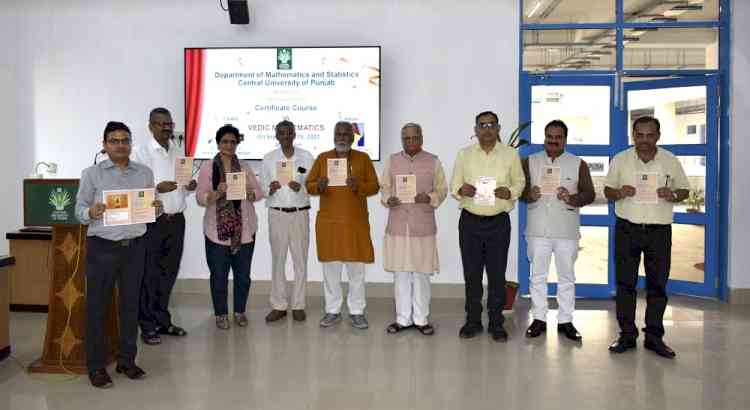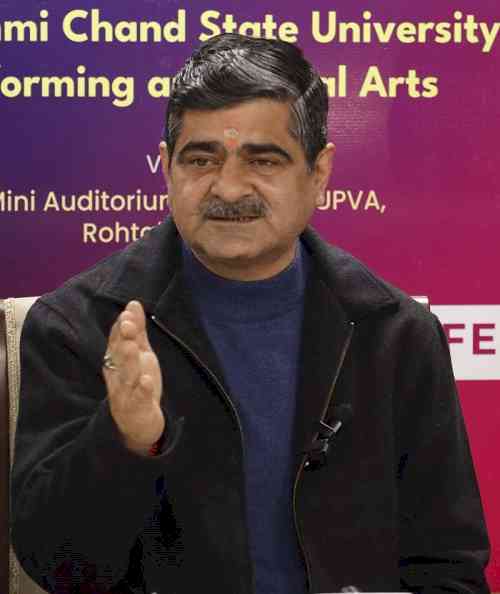Central University of Punjab launched a Certificate Course in Vedic Mathematics to enhance the mathematical ability of students
The Department of Mathematics and Statistics of the Central University of Punjab, Bathinda (CUPB), under the patronage of Vice-Chancellor Prof. Raghavendra P. Tiwari, introduced a ‘Certificate Course in Vedic Mathematics’ during an inaugural ceremony held on Wednesday.

Bathinda, September 29, 2022: The Department of Mathematics and Statistics of the Central University of Punjab, Bathinda (CUPB), under the patronage of Vice-Chancellor Prof. Raghavendra P. Tiwari, introduced a ‘Certificate Course in Vedic Mathematics’ during an inaugural ceremony held on Wednesday. The Chief Guest of this programme was Shri Atul Bhai Kothari, National Secretary, SSUN-New Delhi. The distinguished speakers of this programme were Prof. R. K. Mishra from SLIET Longolowal and Dr. Rakesh Bhatia from Board of School Education, Haryana (BSEH).
At the outset, Prof. R. Wusirika, Dean Incharge Academics presented the welcome address. Dr. Deep Singh, Head, Dept. of Mathematics and Statistics, CUPB, in his introductory address, mentioned that Vedic mathematics simplifies not only the fundamental arithmetic operations such as multiplication and division, but also more advanced concepts such as simultaneous equations, percentage calculations, factorizations, trigonometric calculations, quadratic equations, etc. He stated that the Certificate Course in Vedic Mathematics offered at CUPB is a six-month course in which candidates who have passed the 12th standard exam in any stream can apply. The classes for the first batch of this course will commence from January 2023 onwards and details of the admission process will soon be updated on the university website. He underlined that Vedic mathematical techniques are rapidly emerging as tools for students appearing in various competitive examinations where speed plays an important role and that this programme will help students do complex calculations mentally (without using pen and paper) within a fraction of seconds.
While interacting with the participants, Prof. R. K. Mishra discussed the importance of Vedic Mathematics in solving problems of real life. He demonstrated how one can do complex calculations in a simple and quick manner and how it can be correlated the relationship of Vedic mathematics with other disciplines like psychology, space, etc. Dr. Rakesh Bhatia gave an introduction about how one can do calculations in multiple ways using the 16 Vedic Sutras and 13 Sub-sutras.
The Chief Guest of the programme, Shri Atul Bhai Kothari ji, congratulated the members of the Department of Mathematics & Statistics for starting a certificate course in Vedic Mathematics and encouraged them to conduct further research in this field. He shared many incidents with the audience that how the Vedic mathematics course helped various students. He emphasized the fact that the Indian Knowledge System has the power to attract the world and make India VishwaGuru.
The Vice-Chancellor, Prof. Raghavendra P. Tiwari, in his presidential address, stated that the introduction of courses in Vedic Mathematics is an attempt to sharpen the numerical skills of youngsters, which are deteriorating owing to the increasing use of calculators. He asserted that CUPB is committed to sensitising our students about the concepts of Indian Knowledge Traditions to develop their scientific temperament.
Towards the end of the programme, Prof. Gauree Shankar gave a formal vote of thanks. The programme was moderated by Dr. Sachin Kumar. Prominent among others present on this occasion were Prof. Anjana Munshi, Dean Research, Prof. B.P. Garg, Controller of Examinations and Registrar (O) and faculty members of the Department of Mathematics and Statistics viz., Dr. Anoop Kumar, Dr. Ashok Kumar Pathak, and Dr. Harmanpreet Singh Kapoor. The programme was attended by students, research scholars, and faculty members from various departments of the university.



 City Air News
City Air News 










